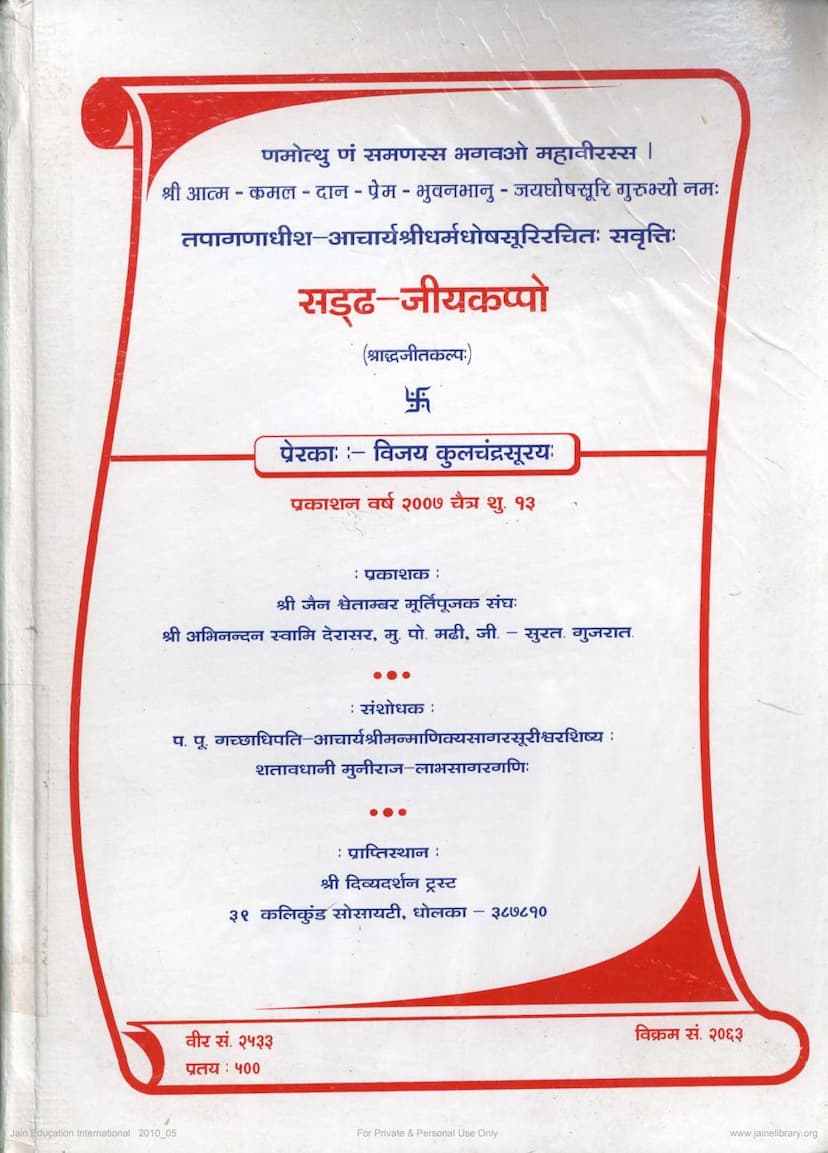Saddha Jiyakappo
Added to library: September 2, 2025

Summary
This document is the Shraddh Jita Kalpa (श्राद्धजीतकल्प), authored by Acharya Shri Dharmghoshsuri. It is a commentary on Jain law and practices, specifically focusing on the conduct and purification rituals for lay followers (Shraddh).
Here's a breakdown of the key aspects and content based on the provided pages:
Book Details:
- Title: Saddha Jiyakappo (श्राद्धजीतकल्पः) - meaning "The Kalpa for the Victories of Lay Followers."
- Author: Acharya Shri Dharmghoshsuri (आचार्यश्रीधर्मधोषसूरि).
- Publisher: Shri Jain Shwetambar Murtipujak Sangh Surat (श्री जैन श्वेताम्बर मूर्तिपूजक संघ, सूरत).
- Year of Publication: 2007 (Vikram Samvat 2063, Veer Samvat 2533).
- Researcher/Editor: Muni Raj Labhsagar Ganiji (मुनीराज-लाभसागरगणिः), disciple of Acharya Shri Manikysagar Surishwarji.
- Inspiration/Patronage: Vijay Kulchandra Suri (विजय कुलचंद्रसूरयः).
Content Overview (Based on the Table of Contents and initial pages):
The book is a comprehensive guide to various transgressions (Atichara) committed by lay Jains and the prescribed penances (Prayashchit) for them. It covers a wide range of situations, actions, and omissions that require purification.
Key Themes and Sections:
- Prostrations and Salutations: Begins with traditional Jain invocations to Lord Mahavir and spiritual gurus.
- Purpose of the Text: Acknowledges the existence of other Kalpas but highlights the need for this specific text for clarity and ease of understanding for lay followers. It emphasizes that penances are prescribed based on tradition and the gravity of the offense.
- Target Audience and Criteria for Understanding: The text is intended for those who are spiritually inclined, well-versed in Jain principles, mature in age, possess sharp intellect, and are adept in understanding both general rules (Utsarga) and exceptions (Apavada). It explicitly states that those who are fickle, weak in character, or critical of scholars are not suitable recipients.
- The Five Kalpas/Behaviors (Pancha Vyavahara): The introduction mentions that the penances discussed will be based on the "Jita Vyavahara" (जीतव्यवहार), which is one of the five types of conduct/practice in Jainism. The five are:
- Agam Vyavahar: Conduct based on the Agamas (scriptures), often involving interpretation by those with deep scriptural knowledge (like Kevalins, Manahparyaya-jnani, etc.).
- Shrut Vyavahar: Conduct based on the study and understanding of scriptures by learned monks.
- Aadnya Vyavahar: Conduct based on the commands and guidance of learned Acharyas.
- Dharana Vyavahar: Conduct based on retaining and applying the penances prescribed by learned individuals.
- Jita Vyavahar: Conduct that is adapted to the times and circumstances, based on the practices of the past but applied in a current, practical manner. This seems to be the primary focus of the book for lay followers.
- Detailed Listing of Transgressions and Penances (Table of Contents indicates extensive coverage): The table of contents reveals the vast scope of the book, covering:
- Penances for specific situations like falling of an idol during worship, touching sacred items improperly, disrespecting gurus or their belongings.
- Penances related to impure food and water.
- Penances for specific actions: not worshipping certain deities, touching impure things, spitting or stepping on things improperly, performing worship incorrectly.
- Penances for ethical and social transgressions: violations related to property, theft, illicit relationships, breaking vows (like fasts or dietary restrictions).
- Penances related to the misuse or disrespect of religious items and offerings (Muhapatti, Asana, Aharadi Guru Dravya, Dev Dravya).
- Penances for accidental harm to living beings (Prithvi Kayadi, Beindriya to Panchendriya).
- Penances for improper conduct during specific times or situations: night time, during illness, while traveling, engaging in forbidden activities.
- Penances related to specific foods and substances: five Udumbara fruits, Vengana, Mahuda, etc., and forbidden items like meat, alcohol, honey.
- Penances for ritualistic purity: cleaning of the Upashraya (monastery), proper use of cleaning tools.
- Penances for speech and conduct: lying, speaking ill of others, breaking vows, showing disrespect to gurus, neglecting duties.
- Penances related to wealth and possessions: misuse of ordinary property, gifts, and donations.
- Penances for violating specific Jain principles like offering charity at the wrong time or place, disrespecting those who practice austerities.
- Penances for specific actions like touching fire, water, or electricity inappropriately.
- Detailed discussions on various aspects of Alochana (confession/repentance), including its method, who should receive it, the qualities of an Alochanaacharya (one who conducts confession), and the merits and demerits associated with it.
- Specific penances for violating rules related to food (e.g., drinking unboiled water, unboiled milk, bathing with boiled water, washing clothes with boiled water).
- Penances related to insects and their habitats.
- Penances for actions like hiding impurities, using old dung for fuel, placing fire improperly, rubbing oneself without proper cleansing, using uncleaned surfaces, doing Pratikraman while sitting, not cleaning the Upashraya properly, taking out the wrong items.
- Penances for theft, adultery, and specific vow violations.
- Penances related to specific foods like the five Udumbara fruits, Vengana, Mahuda, and fermented grains.
- Penances for disrespecting gurus, not taking vows, breaking fasts, and eating at night.
- Penances for actions like sleeping without a valid reason, sleeping without reciting specific verses, not using proper cleansing methods for items, and improper use of items belonging to gurus.
- Penances for various types of misconduct during Pratikraman, Kaussarga, and Vandan.
- Penances for ignoring rules related to knowledge, behavior, vows, and charitable acts.
- The influence of substance (Dravya), place (Kshetra), time (Kala), state of mind (Bhava), person (Purusha), and interaction (Pratisevana) on the penance.
- The benefits of true repentance (Alochana).
- The classification of penances and austerities.
- Discussions on various types of donations and fasts.
Overall Purpose and Significance:
The Shraddh Jita Kalpa aims to provide a clear and practical framework for lay Jains to understand and rectify their transgressions. By detailing the penances for a wide array of actions, it guides followers on the path of purification and adherence to Jain principles, ultimately leading to spiritual progress and liberation. The text emphasizes the importance of sincerity, proper knowledge, and adherence to the guidance of learned monks in performing these penitential acts.